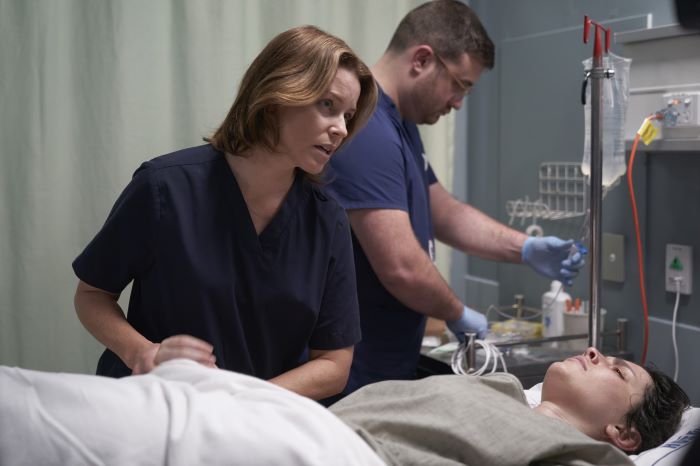Moviegoers who only think of Elizabeth Banks as flighty Effie Trinket (“May the odds ever be in your favor”) in The Hunger Games films will be astonished by the actress’s bravura turn as a skilled Auckland surgeon facing the consequences of a split-second decision made in the operating room. Adapted by Christine Jeffs from Carl Shuker’s 2019 novel, the film opens with Elizabeth Taylor (Banks) called in to perform an emergency laparoscopic procedure on Lisa Williams (Acacia O’Connor), a 29-year-old woman with advanced septicemia.
Assisting as a doctor in training is Richard (a sensitive Richard Crouchley). When Liz asks him to insert the last trochar to drain fluid from Lisa’s abdomen, his nervousness in handling the instrument results in a ruptured intestinal artery necessitating more invasive surgery until the patient is stabilized. (Squeamish viewers may look away during this intensely staged graphic scene.) After the operation, Liz instructs a reluctant, guilt-ridden Richard to tell Lisa’s parents that the procedure went well.
Commuting to work by ferry the next morning, Liz learns by text that Lisa died in the ICU. The tough and stoic surgeon has no time for Richard’s distress, noting that sepsis is probably what killed Lisa. “All we can do is get past it. Move on. Get better. Learn.” But Lisa’s grieving parents can’t until they get answers from Liz. Unsatisfied with her responses, they file a formal complaint and take their story to the press.
At a meeting to discuss the surgery’s aftermath, a defensive Lisa arrogantly calls her condescending boss, Andrew (a chilly Simon McBurney), stupid. She alienates her hospital colleagues at a conference when she objects to the push for greater transparency by publishing surgery results. Even Robin (Mickey Sumner), a nurse and Liz’s lover, breaks off their relationship after Liz is suspended temporarily. “I need this job,” says Robin.
As Liz’s well-ordered life spirals out of control, Bank’s performance shifts gradually from the well-earned confident demeanor of a skilled medical professional to the emotional shakiness of a woman doubting herself. There is more than one mistake made in this sad, intelligent film, and Liz finally breaks down when she realizes the heartbreaking consequences of those decisions.
Cinematographer John Toon effectively captures the film’s melancholy mood with his muted blue tones. His night-time shots of a glittering downtown Auckland as seen from Liz’s house across the harbor vividly highlight the character’s isolation. Haim Frank Ilfman’s expressive score matches the restraint of Jeff’s screenplay and filmmaking. (This is the New Zealand director’s first movie since 2008’s Sunshine Cleaning.)
With its superb cast and sensitive direction, A Mistake raises plenty of thoughtful questions about accountability, forgiveness, and empathy.

















Leave A Comment